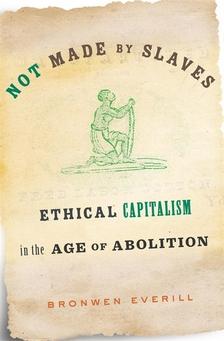Ethical Capitalism, in the Age of Abolition and Now
There’s a saying that history doesn’t repeat itself, but that it often rhymes. In the case of my new book, Not Made By Slaves: Ethical Capitalism in the Age of Abolition (Harvard, 2020) the research and publication were bracketed by the spread of two deadly viruses: Ebola in 2014 and COVID-19 in 2020.

In 2013, I was awarded a three-year Leverhulme Early Career Fellowship to begin work on a project entitled African Trade and Ethical Consumption in the Atlantic World. I imagined it would build on my fieldwork experience in Sierra Leone and Liberia (the subject of my first book). When Ebola cut off access to those countries, I found myself in Senegal and Gambia instead. The archives in Senegal and Gambia – including the valuable oral archives at Fajara in Gambia – reshaped the project.
Initially, I had been interested in exploring how British and American abolitionists engaging in projects like the sugar abstention campaigns of the 1790s or the Free Produce Movement from the 1820s sourced their ‘free labour’ goods. As people stopped buying goods produced with enslaved labour, they sought out alternatives from other sources, like East India Sugar and Nigerian cotton. In particular, I was interested in how they connected with a different set of abolitionists working to undermine the slave trade with ‘legitimate commerce’. Legitimate commerce was a strategy by which merchants sought out other goods to export from African markets (palm oil, peanuts, dyewoods, ivory) in order to enable African traders and leaders who had become dependant on the slave trade for their wealth and power to find a new source of income. I wanted to find out how the abolitionist ‘ethical’ supply chain operated, and how the businesses involved used innovative strategies of branding, shopping, and lobbying to make abolitionism profitable.
While the book does explore this, my fateful digression to Senegal and Gambia showed me that there was more to the story. A document in the archives in Dakar, from 1785, for instance, showed that in that year the trade in enslaved captives was stopped by the new leader of Futa Toro, a revolutionary state on the Senegal River, who argued that the Atlantic slave trade was illegal and immoral. This trade boycott helped to shed new light on some of the sources I already had from Sierra Leone. The Sierra Leone sources showed that African traders in the region were willing to pay more for European imports with no ties to slave trading merchants. Together with the Senegal archives, a picture began to emerge of a variety of African actors who were using purchasing and trade boycotts as tools in the fight against the Atlantic slave trade. Commercial abolition movements had origins in Africa as much as in Europe and the United States.
This opened up a new way of understanding how some African political leaders thought about the Atlantic slave trade at the end of the eighteenth century and what their rejections of that trade might mean for thinking about the origins of abolitionist sentiment in the Atlantic World more generally. The book argues that the expansion of global commerce in the eighteenth century reshaped the relationship between consumers, the global economy, and politics in Atlantic Africa as much as in the European and American Atlantic. And it was this relationship – and the excesses of global commerce that became increasingly obvious in the late eighteenth century Atlantic slave trade – that led to a series of slave trade boycotts, abstention campaigns, and movements for ethical consumption.
Once I saw how the development of commerce in the eighteenth century brought all of these regions together, it was easier to see why abolitionists continued to frame their fight against the slave trade and enslaved labour in commercial terms. Throughout the nineteenth century, abolitionists repeatedly returned to the idea of the consumer’s power to reshape demand and the market’s ability to reform global commerce.
Connecting up the Atlantic World in this way also explained how other events in West Africa fit into the wider Atlantic, and more well-known American, story of territorial expansion. The oral archives in Gambia told of migrations away from the centres of slaveholder power in order to grow peanuts and millet for legitimate commerce to undermine the slave trade. In recordings held at the archive, Griots, the keepers of oral history, recounted how the tax bases of the slave-trading kingdoms evaporated during abolition in the mid-nineteenth century. In response, slave-trading leaders looked to bring new lands under their rule, which led to more warfare and new threats of enslavement. People fled these areas and sought out new territory in which to establish themselves as peanut farmers, either independently or through attachments to religious brotherhoods. This was a story that connected the search for free-labour goods with a search for independence and self-sufficiency, but also with migration and the colonial seizure of territory, as global consumer capitalism expanded in the second half of the nineteenth century.
Since the book’s publication in the autumn, many people have commented to me about how timely it is, as protests over the summer of 2020 ignited new discussions of positive purchasing in support of local Black businesses hit by COVID-19, big name brands aligned their marketing with messages of social and racial responsibility, and America and Britain grappled with their histories of slavery. But as with the research process for the book itself, the timing was a matter of chance.
Today, it can feel as though all events are global events – from pandemics, to the rise of political and religious extremism, to resurgent isolationism and nationalism. That we are are all connected by what we buy and from whom we buy it can seem both obvious and obscured by the complexity of the supply chain. People supporting causes as disparate as Black Lives Matter, Brexit, climate change activism, and COVID-19 denialism can all use boycotts and consumption to exert some kind of control over that supply chain by linking purchases to political identity.
Not Made By Slaves argues that these impulses are not new. Looking at attempts to combat the slave trade and enslaved labour in the nineteenth century can help us to better understand the ways that consumption and politics are linked. The history of ethical capitalism is not repeating itself, but it certainly rhymes.
Bronwen Everill is the 1973 Lecturer in History, Gonville & Caius College. Her most recent book, Not Made By Slaves: Ethical Capitalism in the Age of Abolition, was published by Harvard University Press in 2020.

